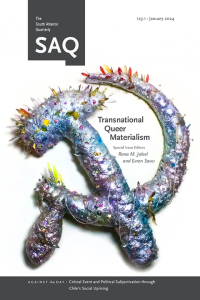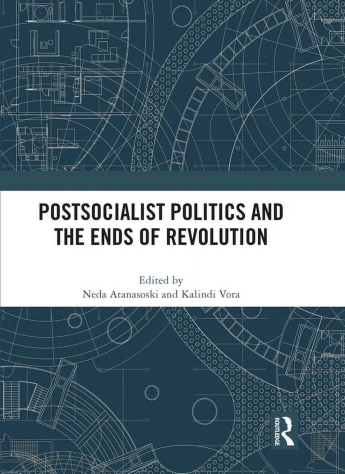Neda Atanasoski

Professor and Chair, The Harriet Tubman Department of Women, Gender, and Sexuality Studies
3121 Susquehanna Hall
Get Directions
Education
Ph.D., Literature and Cultural Studies, University of California San Diego
Research Expertise
Critical Race Theory
Cultural Studies
Decolonial Feminisms
Feminist Science Studies
Media Studies
Postcolonial Feminisms
Transnational Feminisms
Visual Culture
Neda Atanasoski is Professor and Chair of the Harriet Tubman Department of Women, Gender and Sexuality Studies at the University of Maryland, College Park and Associate Director of Education for the Artificial Intelligence Interdisciplinary Institute at Maryland (AIM). Atanasoski’s interdisciplinary research has focused on feminism and AI, feminist and critical race approaches to science and technology studies, AI and the future of work, militarism, and human rights and humanitarianism. She is the author of Humanitarian Violence: The U.S. Deployment of Diversity (2013), co-author of Surrogate Humanity: Race, Robots, and the Politics of Technological Futures (2019), and co-editor of Postsocialist Politics and the Ends of Revolution (2022) and Technocreep and the Politics of Things Not Seen (2025). She serves on the editorial collective of the journal Critical Ethnic Studies, the flagship journal of the Critical Ethnic Studies Association. Atanasoski has been the recipient of numerous grants, including the Mellon Affirming Multivocal Humanities Grant, the University of California Multicampus Program Initiative Grant, the Luce Foundation Humanities Studio Grant, the University of California Humanities Research Institute Working Group Grant, and the Center for New Racial Studies Research Grant. Atanasoski has also held a number of fellowships and visiting professorships, including the Mercator Visiting Professorship of AI in the Human Context at the Center for Science and Thought at the University of Bonn, the GEXcel International Collegium for Advanced Transdisciplinary Gender Studies Visiting Research Fellowship in Sweden, the UC Humanities Research Institute Residential Fellowship at UC Irvine, the Hellman Foundation Fellowship, and the UC President’s Postdoctoral Fellowship at UC Berkeley. Previously, Atanasoski was Professor of Feminist Studies and Critical Race and Ethnic Studies and the founding co-Director of the Center for Racial Justice at The University of California at Santa Cruz.
Publications
Postsocialist Politics and the End of Revolution
"Postsocialism and the Politics of Dissent" redefines the study of socialism by exploring its decolonial and antiracist dimensions beyond state socialism. This anthology connects the legacies of socialist projects across regions like the Middle East, Scan
Author/Lead: Neda AtanasoskiMoving past the conflation of state socialism with all socialist projects, this book opens up avenues for addressing socialist projects rooted in decolonial and antiracist politics. To that end, this anthology brings together scholarship across regions that engages postsocialism as an analytic that connects the ‘afters’ of the capitalist– socialist dynamic to present day politics. Resisting the revolutionary teleology of what was before, “postsocialism” can function to create space to work through ongoing legacies of socialisms in the present.
Looking at the Middle East, Scandanavia, Korea, Romania, China, and the US, the chapters in this book assess ongoing socialist legacies in new ethical collectivities and networks of dissent opposing state- and corporate- based military, economic, and cultural expansionism since the end of the Cold War.
The majority of the chapters in this book were originally published as a special issue of the journal, Social Identities.
Read More about Postsocialist Politics and the End of Revolution
Reproducing Racial Capitalism: Sexual Slavery and Islam at the Edges of Queer of Color Critique
Dr. Atanasoski publishes new article with Dr Rana Jaleel in South Atlantic Quarterly
Author/Lead: Neda AtanasoskiNon-ARHU Contributor(s): Rana M. Jaleel, Cultural Studies Chair, Associate Professor, University of California Davis

This article tracks contemporary debates surrounding human trafficking, sex slavery, and the slave trade, in which the specter of the Ottoman empire and its system of slavery—as well as other “Oriental” slave systems—emerge as templates for imagining the place of sex in slavery. At the same time, the authors highlight how Ottoman and “Oriental” slavery is largely considered irrelevant to the genealogy of present‐day racial capitalism. By contrast, the authors argue that considering historically parallel and entangled slave systems is important not just to accounts of modern‐day slavery but also for how we conceptualize the “racial” in racial capitalism and the “queer” and “of color” in queer of color critique. Building on Black feminist historiography on the transatlantic slave trade, the commitments of queer of color critique, and contemporary research concerning sexual violation and racial capitalism, the authors explore how interconnected struggles across the globe are partitioned by imagined frameworks of racial and sexual difference that isolate entangled systems of gendered and sexual enslavement.



